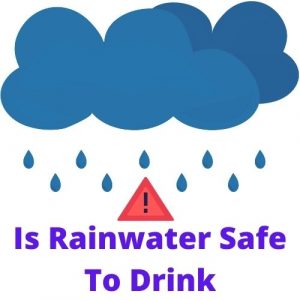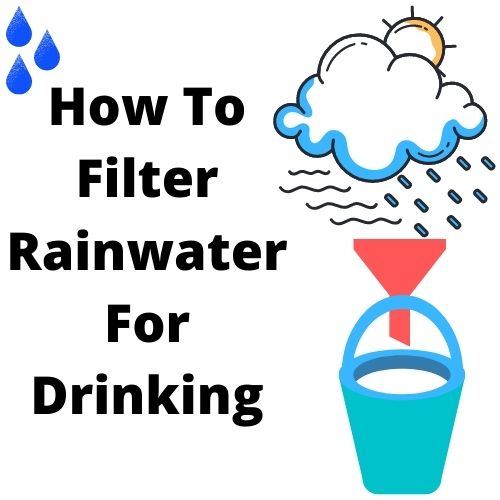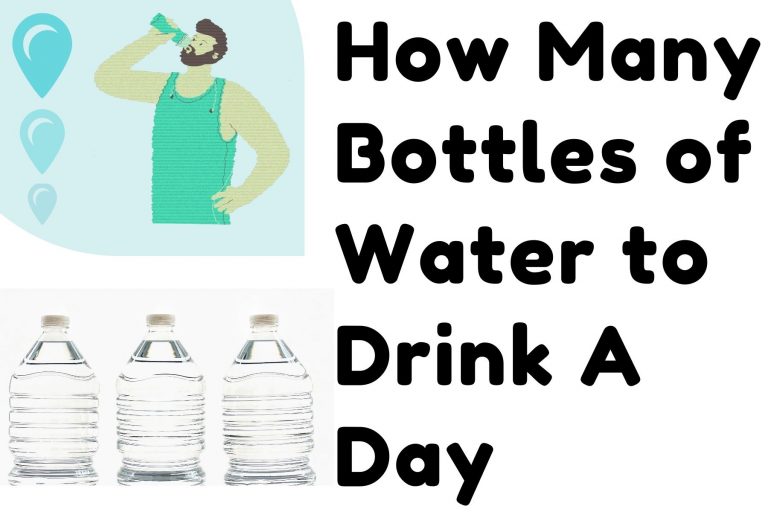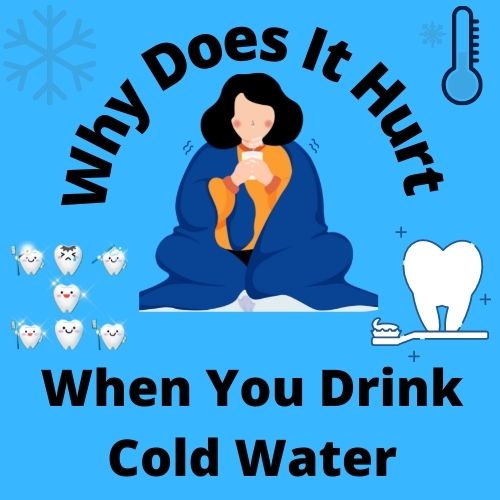Can You Drink Rainwater (A complete explanation backed by evidence)

Water composes almost 70% of our body. Without water, there’s no you or us. That’s why water means life. We feel an extreme connection to water whenever we drink it. And we always raise questions before drinking if the water is pure or dirty. When it comes to rainwater, hundreds of questions arise as usual. How clean is rainwater to drink? Can you drink rainwater? Is rainwater safe to drink from the sky?
There was a time when the world was cleaner and greener, and troubles were far less than now. Nature was fresh, and natural water was refreshing. Clean water was available and readily accessible in wells, mountain valleys, springs, reservoirs. As the world advances towards a tech-savvy world, is it paying heed to a safer world?
As the world temperature is increasing day by day, seasonal changes are happening rapidly. Climate change seems inevitable. As water sources are decreasing day by day, it’s time we harness the potential of rainwater and use it wisely. Rainwater is the purest form of water that’s also the source of other forms of water.
Is rainwater clean to drink
Is rainwater pure or dirty? That’s a million-dollar question, literally. Showcasing rainwater as an absolute impure water source opens the door of million dollars purifying businesses.
Rainwater was pure enough to drink just a few decades back. You don’t have to go to the stone age. In the 1950s, people could fearlessly drink and store rainwater and use it for various purposes. They just opened their mouths to ingest the downpouring raindrops. It’s so much easier then.
If you plan to harvest rainwater, you need to consider some factors carefully. The clouds downpour the purest form of water that may get polluted when they reach their desired destination. They can be contaminated by-
- Germs and pathogens in the air
- Yellow dust
- Metallic waste in the rooftops
- Particles in the water container
Some ions or acids in the clouds can be harmful due to the instability of thunderstorms. However, the clouds downpour the purest form of water available on the earth. If your living area is heavily industrialized, rainwater may get contaminated with heavy particles in the air. It may cause acid rain in your area.
Usually, the air isn’t so fresh and clear these days due to urbanization in every country. The carbon effusion has reached a maximum that’s happening all over the world. Rainwater gets polluted by the dust and solid chemicals in the air. Rainwater dissolves the carbon dioxide in the atmosphere and becomes acidic. That’s why you’ll need a purification process to get it pure again. You can determine the purity of rainwater by measuring the TDS value.
When you harvest rainwater, you’ll need water containers. If you collect it from rooftops, there’s a high risk of rust metals contamination with the collected rainwater. The jars and bottles you use to store rainwater may cause pollution and contamination. So it would be wise if you were very careful about drinking rainwater through this process.
So is it safe to drink rainwater? Yes, it is. But you have to be thoroughly careful through the water storing processes. And sometimes, you need to curate the rainwater if your surrounding environment ranks higher in air pollution.
Some industrialized areas like Texas, Oregon, Pennsylvania, Arizona, New York have more air pollution rates. Drinking rainwater without any treatment may cause health hazards in these areas. However, yellow dust pollution has little impact on drinking rainwater as it easily sediments if you keep the rainwater stagnant for some period.
Is rainwater safe to drink from the sky
The days aren’t far from now when there’s no restriction in drinking rainwater. Parents didn’t scold their children for drinking rainwater straight from the sky. Children usually love to play in the rainwater, and they just gape open their mouths and drink rainwater straight from the sky. But is it safe to drink rainwater from the sky? The question has been lots of conscious parents in the recent decades.
The scenario has changed a lot since the 20th century due to lots of revolutionary inventions and industrialization on our beautiful earth. If a kid goes outside in the rain, parents shout at them to return home immediately. There’s, of course, a reason that the kids may catch a cold. But some parents also tell their kids that they might become bald if they get drenched in the rainwater. It’s because the rainwater is too acidic, they say.
If you reside in a highly polluted or densely populated area, rainwater may get polluted with dust, soots, or pathogens in the air. The pH of rainwater usually ranges from 5 to 5.5, according to the U.S. Environmental Protection Agency. However, the pH greatly varies depending on urban, rural, or heavily industrialized areas. But it’s not alarming because the scale is close to the pH of normal drinking water, which is around 6. Next time you drink Coca-Cola, know that its pH is highly acidic, ranging from 2.5 to 4.
Let’s get straight to the point of whether drinking rainwater from the sky is safe or not. For the first 20 minutes, let the rainwater dissolve most of the pollutants in the air. If it’s raining cats and dogs, the first 20 or 30 minutes is enough to decrease the level of contamination of rainwater. So you can drink the rainwater straight from the sky after 20 minutes as it’s completely safe by then.
However, drinking rainwater in a region with heavy industries needs some extra caution. Rainwater might get mixed with the sulfur dioxide and nitric oxide in the air and downpour as acid rain, which can be catastrophic. So we can conclude that in the time of rapid urbanization, it’s better to treat rainwater before drinking. But if you’re from a less urbanized or industrialized area, you can comfortably drink rainwater straight from the sky.
But the rainwater from the sky is fresh, tepid, and sometimes cold that can hurt your teeth.
Can you drink rainwater after boiling it
As we discussed earlier, rainwater is the purest form of water, but it may get polluted in its way towards the earth due to the presence of various soots in the air. And during the storing process, there’s a considerable chance of rainwater pollution. So if you boil the rainwater, it’ll be purer again.
Boiling rainwater will kill all the viruses, bacteria, and protozoa present in the water. The heat will denature the protein configuration of the pathogens. So it’ll be wise to drink rainwater after boiling it. It’ll ensure no more presence of pathogens in your purest form of water.
In a heavily urbanized area, yellow dust in the air can pollute the rainwater. While storing the rainwater, give it time to settle the heavy particles in the water. And then boil the rainwater and drink the purest form of water available on the earth.
Can you drink rainwater at sea
Rainwater is the best source of drinking water if you’re stranded in the sea. If the chemical and mechanical processes fail to produce pure drinking water from seawater, then you better hurry to harness the potential of rainwater at sea.
You can drink rainwater at sea because there’s less chance of contamination and pollution. However, at sea, you won’t find the freshest water. Sea salt may get mixed with rainwater during the storing process. If you’re using tarpaulin, try to get it salt-free as much as possible. The seawater vapor may get mixed with the rainwater. But the mixture of a little salt is not a problem at all. So you can drink rainwater at sea without any fear of getting infected.
Is rainwater safer to drink than seawater? Of course, it is. It lessens the hectic works of purifying seawater into freshwater. You can save the expenses of carrying the chemical and mechanical procedures to purify seawater. Nevertheless, drinking rainwater will lessen the load on the stored water in your sea vessels. It would be best to harvest the rainwater to drink as soon as possible when it rains.
Can you drink rainwater without boiling it
You can drink rainwater without boiling it under certain conditions. If you live in the countryside, far from urbanization and industrialization, you can drink rainwater without boiling it. The airspace in the mountainside and the rural regions is far greener and fresher than the urban areas. If you can store rainwater in a sanitary manner, it is safe to drink. If it’s thicker dust in the rainwater, give time for sedimentation of the dust and then drink it to your heart.
Can you drink rainwater to survive
Survival is about your existence on the earth. If you’re stranded somewhere without access to water, you need to depend on the rainwater. Just gaping open the mouth will not suffice your survival period. You’ll need to think about storing rainwater.
If you’re stranded on an island, sea, or jungle, you’ll be lucky to have a rainy day. Rainwater straight from the sky is drinkable and usually won’t cause any diseases. The rainwater may taste good if you store it from the sky. So can you drink rainwater to survive? Everything you do to survive in a stranded and lawless land is permissible if it lingers your existence on this beautiful earth.
Is it a good practice to drink rainwater
Drinking rainwater is a good practice if you’re in an area with less access to freshwater. If you have enough clean water in your area, then dinking rainwater may get hassling. However, rainwater is the source of all water we drink every day. The rainwater goes underground and comes in tubewell, well, and municipal storage system. Bottled water comes from rainwater with a bit of treatment.
Building a habit of drinking water is a good thing. You need to drink a few liters of water to stay hydrated for the day and keep your body functioning smoothly. If you need rainwater to meet the demand, it’s fine to drink it. Moreover, you can use rainwater for various purposes like gardening, farming, etc.



